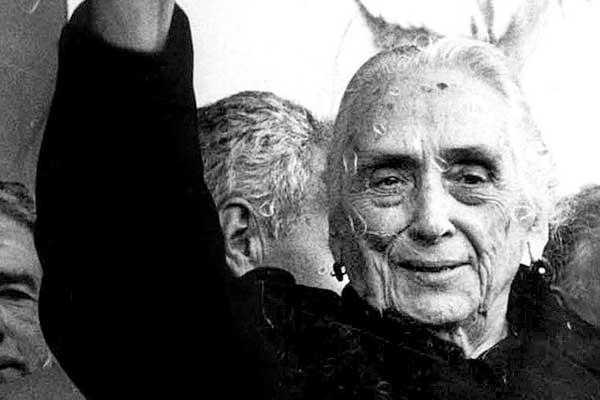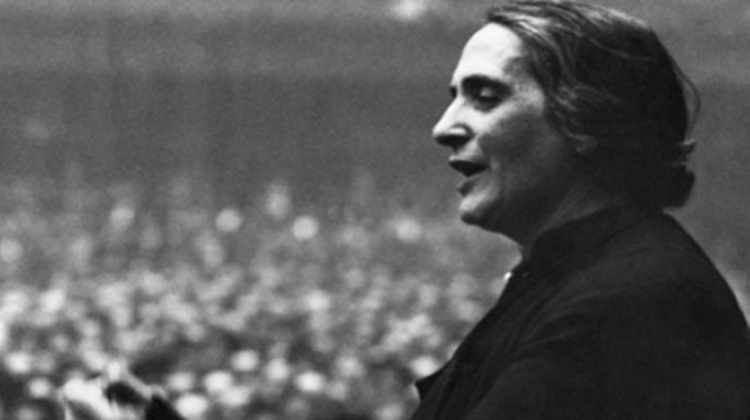
Photo via EL BLOG DE CARLOS
1. Her mother took her to be exorcised
Dolores Ibarruri was born as one of eleven children in the mining family in Gallarta, Basque mining village.
Even though she had a rough religious upbringing, at an early age she started questioning authority and religion while she was also affected by hard work her fader had to endure in mines. She went to municipal school, where discipline was very harsh and the curriculum was mainly religious.
When she was ten years old, due to her rebellious spirit, her mother took her to exorcism. The exorcism took place in Deusto, in the Church of San Felicisimo. All this effort draw her even further from the church.
2. She was supposed to be a teacher
Even though she started school early, she had to leave it at the age of fifteen, because her parents could not afford it.
Dolores spent two years preparing for the teacher’s college before she had to leave it to find a job. She worked as a housemaid, seamstress, and a waitress. While she was waitressing in Arboleda, the most developed town in her region she met her first love, Julián Ruiz Gabiña.
It was he who introduced her to socialism and Marx. Her future husband Julián was a founder of Socialist Youth of their region, and because of that was in and out of prison a lot. She spent that time reading about Socialism and Marx and taking care of their first child.

Photo by: QuotesGram
3. La Pasionaria is her alias since she wrote her first article
In the year of 1918, she wrote her first article. It was for the El Minero Vizcaino, the miners’ newspapers.
In this article, she criticized religious hypocrisy, and because the article was published during the Holy Week she used alias instead of her name. The alias La Pasionaria will stick with her for the rest of her life.
Two years later she would join the Communist Party of Spain (PCE) where her career as socialist and Marxist began. After she moved to Madrid in 1931 Dolores became the editor of Mundo Obrero, the PCE newspaper. She wrote articles even while she was imprisoned for her political activities.
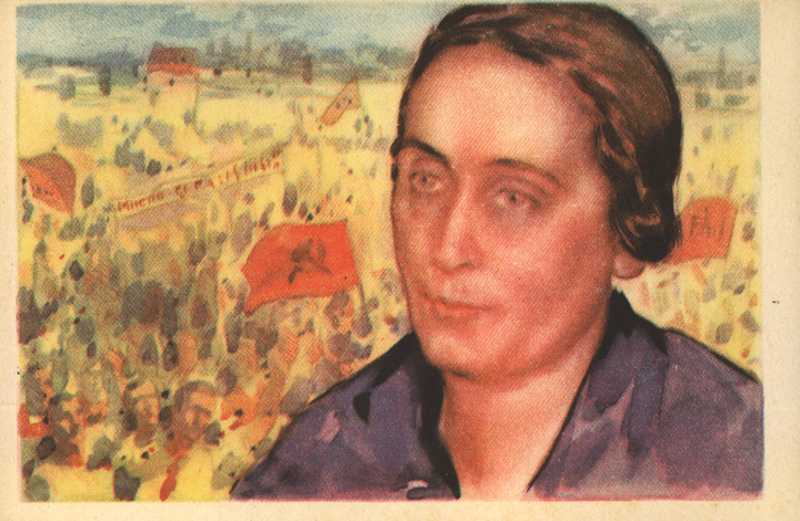
Photo via: Wolfsonian
4. She had 6 children
With her husband Julián Ruiz Gabiña, she had six children. Five of them were girls and one boy. However, four girls died while they were very young.
The boy Ruben and girl Amaya survived their childhood. Since she divorced Julián in 1930, she sent her kids to the Soviet Union. It was after she was arrested once again in 1934, that she made that hard decision and in spring 1935 brother and sister traveled away.
While the Spanish civil war lasted from 1936 – 39 she wrote to her son, telling him how difficult the situation was in Spain. Her son Ruben died young while in the Soviet Union, while her daughter outlived her and came back to Madrid in 2008.
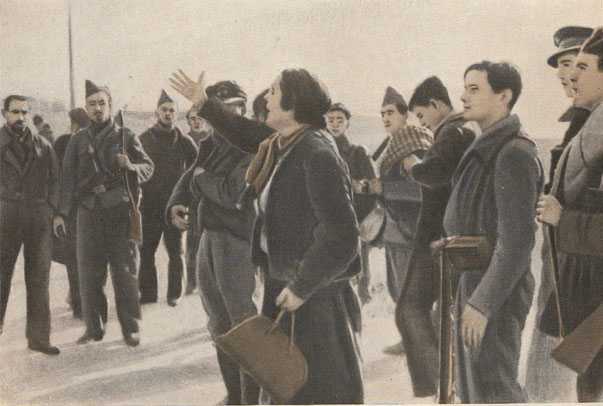
Photo via: Marxists
5. While in jail, she organized the inmates
The first time she was arrested was in September 1931. The place where she was jailed had common and political offenders mixed up.
Dolores persuaded all of them to begin a hunger strike demanding freedom for political offenders. Next time she was arrested in March 1932 she managed to organize inmates to sing “The Internationale” while they were in the visiting room.
Also, she fought against hard labor for which inmates were paid poorly. Even though imprisoned she was elected as a member of the Central Committee of Communist party during their 4th Congress, which took place on March 17, 1932, in Seville. Ibarruri was arrested many more times, mostly for political activities and sometimes for her engagement in wars in Spain.
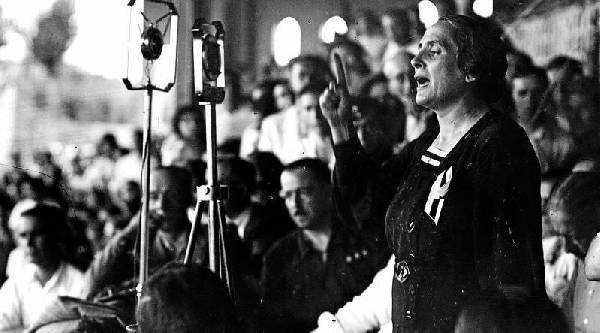
Photo via: Noticias de Gipuzkoa
6. She was the founder of Mujeres Antifascistas
Before World War II fascism rose in many countries and with it many organizations were against it.
Ibarruri founded Mujeres Antifascistas (Women Antifascists) in 1933, which was, as its name says a women’s organization that was against Fascism and war. Next year she was a part of First Worldwide Meeting of Women against War and Fascism (Rassemblement Mondial des femmes contre la guerre et le fascisme) that took place in Paris, France.
This organization dissolved in 1939. In 1936 she became a member of Parliament representing PCE, since they won enough votes to seat one member. The first thing she has done when elected was freeing political detainees from the prison of Oviedo.
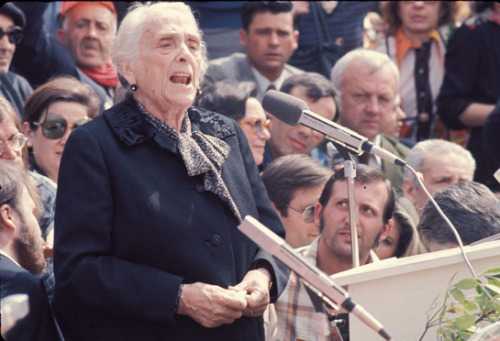
Photo via: Tumblr
7. She rescued more than 100 children from starvation and was jailed for it
After the October Revolution that was stifled by General Franco in the name of the Republican Government, many were closed in jails.
Their children were left behind in the mining region of Asturias. There were more than a hundred of them and they were starving. Ibarruri with the help of two more people led a very risky mission to rescue those children and to bring them to Madrid.
They succeeded, however, this heroic act again got her in prison, first, they sent her to Sama de Langre and later to Oviedo. After she got out she decided to send her kids away, so they would not suffer due to her actions.
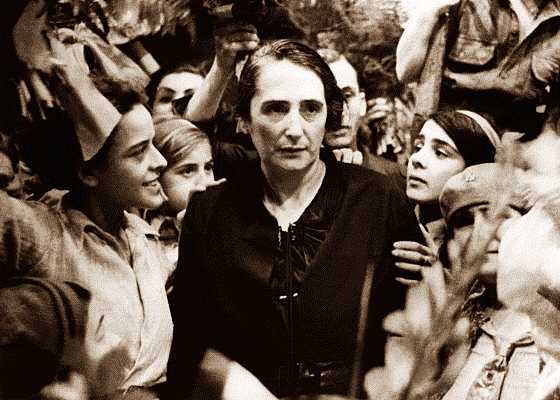
Photo via: EU-UP SIMAT DE LA VALLDIGNA
8. “No Passaran” was her battle cry
Even though the title says things you did not know about Dolores Ibarruri, this fact you probably did know, but we just could not skip it and not mention it.
Besides “No Passaran” she coined many other strings from her speeches that were broadcasted from Madrid. Some of them are “Danger! To arms!”, “Our fighters must lack for nothing!”, “Discipline, composure, vigilance!”, “Restrain the hand of the foreign meddlers!”
“Better to die on your feet than live on your knees!”, “A salute to our militiawomen on the front line”, “Our battle cry has been heard by the whole world” and many others. She was very eloquent and very good in propaganda, which is why the communist party made an icon out of her.
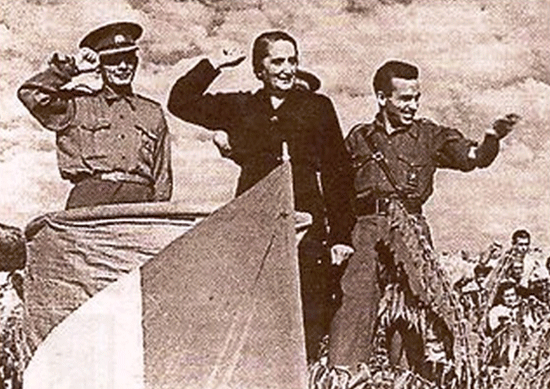
Photo via: Nueva Tribuna
9. She managed Radio España Independiente from Russia
In her exile during World War II in Moscow, she got an offer to be in charge of the radio station that broadcasted to Spanish citizens that were under Franco at the time.
The radio was called Radio España Independiente but the majority of people back house called just “La Pirenaica” because they believed that news and reports were broadcasted from Pyrenees. The first broadcast happened in 1941, just one month after German’s invasion of the Soviet Union.
In the beginning, they were located in basements while aerial bombardment was going on. Senior citizens, women, and children were helping her by keeping watch from terraces of Soviet’s Capital.
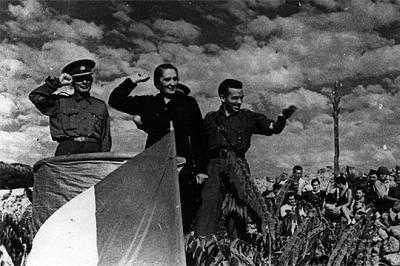
Photo via: Disonancias Santos Zapata
10. Her son died at the battle for Stalingrad
The Soviet Union took many refugees from Spain and to thank them, many of them wanted to fight with Russians and help them.
Stalin initially disapproved, but later allowed it. In her book, Dolores stated that more than 200 of them died in battle including her son. In 1941 Spanish 4ht Special Unit got the opportunity to defend the Kremlin.
And in other the countries, many Spanish volunteers fought, some as guerrillas behind enemy lines, some with Red Army. After Ibarruri’s son, Ruben Ruiz Ibarruri an asteroid 2423 Ibarruri was named.

